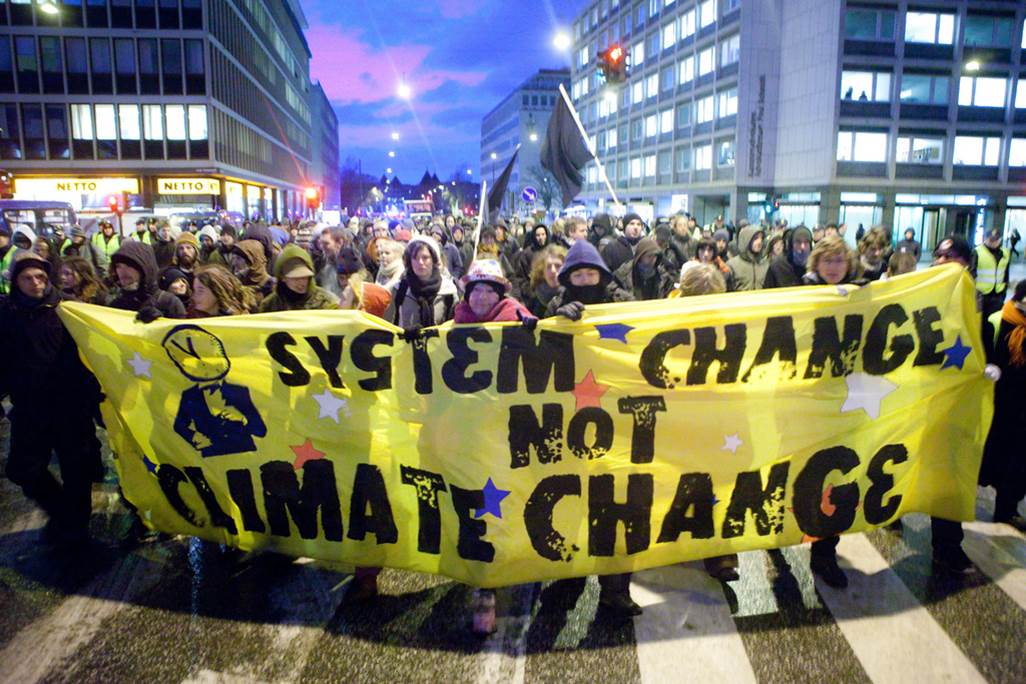
By Adam Marletta
Two recent letters to the editor in the Portland Press Herald/Maine Sunday Telegram illustrate the limits of the conventional thinking on climate change and how we can most effectively fight it. Both are worth examining if the left is to move beyond this myopic — and, frankly, erroneous — understanding of the climate crisis.
Len Frenkel of South Portland, echoes the environmental movement’s longstanding concept of employing individual acts to mitigate climate change. (“As warming threatens planet, humans will have to make sacrifices,” 07/31/2018.)
“There are many actions that we, as individuals, can take without our government’s involvement,” Frenkel writes. “But they will be severe and very unpopular. We need to drastically reduce our carbon footprints.”
He continues:
… We can choose to fly for vacations and trips, or not. We can choose to buy unnecessary stuff, or not. We can choose to have second homes, or not. We can choose to eat animal foods, or not. We can choose to have another consumer child, or not. We can choose to travel to entertainment centers, or not. All of these human activities, which are so popular in industrialized nations, are very serious contributors to the greenhouse gases that cause runaway climate change.
This individualist orientation to combating climate change has long been the main focus of the environmental movement — however, that has changed considerably in recent years as the environmental left has undergone something of a radicalization.
It was, nonetheless, the main argument in Al Gore’s 2006 documentary film, An Inconvenient Truth. After expertly and candidly explaining the science of climate change, and highlighting the dangers of rising sea levels, increased “superstorm” hurricanes, and melting ice caps, Gore’s proposed solution is merely for viewers to change their light bulbs, recycle more, drive less, and purchase carbon offsets.
These are all fine, altruistic actions, no doubt. I would certainly never discourage anyone from undertaking any of them. But given the global scale of the climate crisis, the unfortunate reality is individual actions, while no doubt well intended, are essentially worthless in reducing the threat of climate change.
As Martin Lukacs writes of the obvious limits of these small-scale solutions in a 2017 op-ed for The Guardian, “Would you advise someone to flap towels in a burning house? To bring a flyswatter to a gun fight? Yet the counsel we hear on climate change could scarcely be more out of sync with the nature of the crisis.”
Furthermore, the individualist approach to climate change assumes that all Americans share the same carbon footprint — and, as a result, we are all equally to blame for the climate crisis. But that is simply not the case. One hundred corporations — most of them fossil fuel companies like ExxonMobil, Chevron, BP, and Shell — are responsible for 71 percent of global CO2 emissions, since 1988, according the Carbon Majors Report.
This handful of greedy corporations — and, more specifically, the system of capitalism which places short-term profit above the ecosystem that supports all life on the planet — bears most of the responsibility for despoiling the Earth, and threatening the continued existence of the human race — not working-class people like you and me.
(And while we are holding the guilty parties responsible, the anti-science/anti-intellectual Republican Party, and its decades-long propaganda project of denying the very existence of anthropogenic, or human-induced global warming, also shares a great portion of the blame. We have lost precious decades of proactive environmental action due to the Republicans’ deliberate misinformation campaign.)
Thus, Frenkel’s blanket austerity prescription is misguided. It is the rich, the corporate CEOs, and the fossil fuel companies that should curb their unnecessary consumption — not working-class citizens. Bourgeois elites like Elon Musk, Jeff Bezos, Mark Zuckerberg, and Bill Gates, who criss-cross the planet on a near hourly basis in their fleet of private jets, are the ones who can most afford to do without. Working-class people, on the other hand, must commute to work in order to just survive.
The subtitle of Naomi Klein’s landmark 2014 book, This Changes Everything, puts it best: Capitalism vs. The Climate.
While this understanding that capitalism, not humanity at large, caused the climate crisis may have once seemed radical, it has become much more prevalent on the left in recent years, particularly among young climate activists. This trend is highly encouraging and should be built upon.
However, as Frenkel’s editorial demonstrates, there is still much work to be done to build an eco-socialist left capable of both understanding the roots of climate change, and how to best halt the trend of a rapidly warming planet.
But if Frenkel places misguided faith in small-scale solutions to save the planet, William Vaughan, Jr.’s response letter, also published in the PPH (“Our behavior won’t change, so let’s not pretend it will,” 08/06/2018) dismisses any prospects of hope, entirely.
“Mr. Frenkel writes as if there is some chance we will stop flying, stop buying unnecessary things, and so on,” Vaughan writes. “But there is no evidence any of that is happening, or will happen.”
“… And since we will do nothing,” he continues in his pessimistic letter, “children and grandchildren around the world, as well as many other species, will pay the price for our inactions.”
Vaughan concludes:
“Better to face the music than to hope or pretend there is some chance our behavior will significantly change before it is too late. It never has and it never will.”
Well, shit… I guess it is a good thing I do not have any kids of my own… Perhaps we should all just shoot ourselves, now and get it over with?
While Frenkel and Vaughan are both correct to be alarmed about — even, in fact, to despair over — climate change and the fate of the human species, outright fatalism such as Vaughan’s contributes nothing to the environmental conversation. The left gains nothing by drowning in pessimism — if not, indeed, nihilism.
This does not mean we should be pollyannish about the environmental crisis unfolding in front of our eyes. We should be frank about how dire the situation is. Klein is correct: “We are almost at midnight on the climate clock.”
But Vaughan is flat out wrong that “we will do nothing,” to change “our” behavior. Hundreds of people throughout the globe are currently engaged in environmental activism, protests, collective projects, and lectures aimed at halting the continued warming of the planet. Millennials, in particular, are deeply concerned about climate change and routinely rank it as one of their most pressing issues.
Likewise, there is nothing inherently static, greedy, self-centered or risk adverse about human nature, as Vaughan suggests. And, for that matter, it is not “human nature” that is to blame for climate change. It is capitalism — a system that runs quite counter to humans’ natural inclination for sociability, cooperation, and collective action.
If Frenkel’s letter is frustrating in its myopic approach to mitigating global warming, Vaughan’s leaves readers downright enraged over its flippant, pessimistic tone.
But Frenkel is right in one respect: We do have a choice. We can ditch capitalism as an economic system and save the planet, or we can ditch the planet and save capitalism. The wealthy elite have already made it painfully clear which option they prefer. Now it is up to us to ensure they do not get their way.






Capitalism, Not Individual Behavior or “Human Nature,” Caused Climate Change
By Adam Marletta
Two recent letters to the editor in the Portland Press Herald/Maine Sunday Telegram illustrate the limits of the conventional thinking on climate change and how we can most effectively fight it. Both are worth examining if the left is to move beyond this myopic — and, frankly, erroneous — understanding of the climate crisis.
Len Frenkel of South Portland, echoes the environmental movement’s longstanding concept of employing individual acts to mitigate climate change. (“As warming threatens planet, humans will have to make sacrifices,” 07/31/2018.)
“There are many actions that we, as individuals, can take without our government’s involvement,” Frenkel writes. “But they will be severe and very unpopular. We need to drastically reduce our carbon footprints.”
He continues:
This individualist orientation to combating climate change has long been the main focus of the environmental movement — however, that has changed considerably in recent years as the environmental left has undergone something of a radicalization.
It was, nonetheless, the main argument in Al Gore’s 2006 documentary film, An Inconvenient Truth. After expertly and candidly explaining the science of climate change, and highlighting the dangers of rising sea levels, increased “superstorm” hurricanes, and melting ice caps, Gore’s proposed solution is merely for viewers to change their light bulbs, recycle more, drive less, and purchase carbon offsets.
These are all fine, altruistic actions, no doubt. I would certainly never discourage anyone from undertaking any of them. But given the global scale of the climate crisis, the unfortunate reality is individual actions, while no doubt well intended, are essentially worthless in reducing the threat of climate change.
As Martin Lukacs writes of the obvious limits of these small-scale solutions in a 2017 op-ed for The Guardian, “Would you advise someone to flap towels in a burning house? To bring a flyswatter to a gun fight? Yet the counsel we hear on climate change could scarcely be more out of sync with the nature of the crisis.”
Furthermore, the individualist approach to climate change assumes that all Americans share the same carbon footprint — and, as a result, we are all equally to blame for the climate crisis. But that is simply not the case. One hundred corporations — most of them fossil fuel companies like ExxonMobil, Chevron, BP, and Shell — are responsible for 71 percent of global CO2 emissions, since 1988, according the Carbon Majors Report.
This handful of greedy corporations — and, more specifically, the system of capitalism which places short-term profit above the ecosystem that supports all life on the planet — bears most of the responsibility for despoiling the Earth, and threatening the continued existence of the human race — not working-class people like you and me.
(And while we are holding the guilty parties responsible, the anti-science/anti-intellectual Republican Party, and its decades-long propaganda project of denying the very existence of anthropogenic, or human-induced global warming, also shares a great portion of the blame. We have lost precious decades of proactive environmental action due to the Republicans’ deliberate misinformation campaign.)
Thus, Frenkel’s blanket austerity prescription is misguided. It is the rich, the corporate CEOs, and the fossil fuel companies that should curb their unnecessary consumption — not working-class citizens. Bourgeois elites like Elon Musk, Jeff Bezos, Mark Zuckerberg, and Bill Gates, who criss-cross the planet on a near hourly basis in their fleet of private jets, are the ones who can most afford to do without. Working-class people, on the other hand, must commute to work in order to just survive.
The subtitle of Naomi Klein’s landmark 2014 book, This Changes Everything, puts it best: Capitalism vs. The Climate.
While this understanding that capitalism, not humanity at large, caused the climate crisis may have once seemed radical, it has become much more prevalent on the left in recent years, particularly among young climate activists. This trend is highly encouraging and should be built upon.
However, as Frenkel’s editorial demonstrates, there is still much work to be done to build an eco-socialist left capable of both understanding the roots of climate change, and how to best halt the trend of a rapidly warming planet.
But if Frenkel places misguided faith in small-scale solutions to save the planet, William Vaughan, Jr.’s response letter, also published in the PPH (“Our behavior won’t change, so let’s not pretend it will,” 08/06/2018) dismisses any prospects of hope, entirely.
“Mr. Frenkel writes as if there is some chance we will stop flying, stop buying unnecessary things, and so on,” Vaughan writes. “But there is no evidence any of that is happening, or will happen.”
“… And since we will do nothing,” he continues in his pessimistic letter, “children and grandchildren around the world, as well as many other species, will pay the price for our inactions.”
Vaughan concludes:
“Better to face the music than to hope or pretend there is some chance our behavior will significantly change before it is too late. It never has and it never will.”
Well, shit… I guess it is a good thing I do not have any kids of my own… Perhaps we should all just shoot ourselves, now and get it over with?
While Frenkel and Vaughan are both correct to be alarmed about — even, in fact, to despair over — climate change and the fate of the human species, outright fatalism such as Vaughan’s contributes nothing to the environmental conversation. The left gains nothing by drowning in pessimism — if not, indeed, nihilism.
This does not mean we should be pollyannish about the environmental crisis unfolding in front of our eyes. We should be frank about how dire the situation is. Klein is correct: “We are almost at midnight on the climate clock.”
But Vaughan is flat out wrong that “we will do nothing,” to change “our” behavior. Hundreds of people throughout the globe are currently engaged in environmental activism, protests, collective projects, and lectures aimed at halting the continued warming of the planet. Millennials, in particular, are deeply concerned about climate change and routinely rank it as one of their most pressing issues.
Likewise, there is nothing inherently static, greedy, self-centered or risk adverse about human nature, as Vaughan suggests. And, for that matter, it is not “human nature” that is to blame for climate change. It is capitalism — a system that runs quite counter to humans’ natural inclination for sociability, cooperation, and collective action.
If Frenkel’s letter is frustrating in its myopic approach to mitigating global warming, Vaughan’s leaves readers downright enraged over its flippant, pessimistic tone.
But Frenkel is right in one respect: We do have a choice. We can ditch capitalism as an economic system and save the planet, or we can ditch the planet and save capitalism. The wealthy elite have already made it painfully clear which option they prefer. Now it is up to us to ensure they do not get their way.